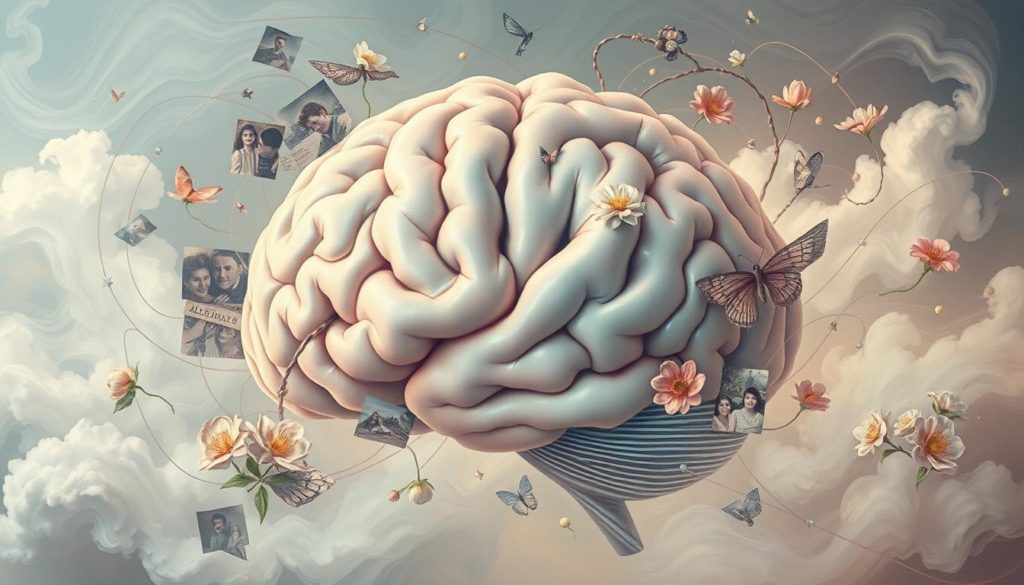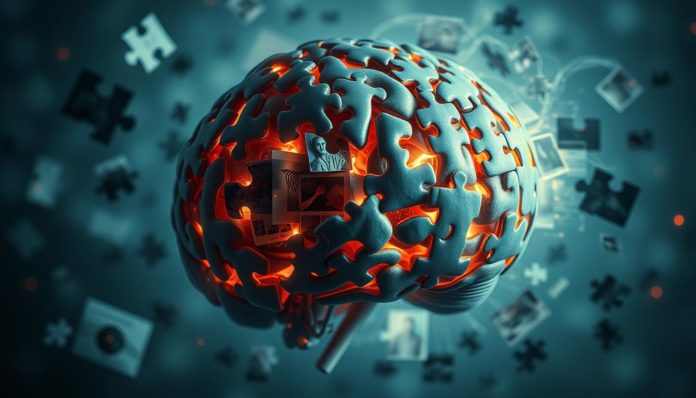Did you know nearly 50% of Alzheimer’s patients deal with more than memory issues? It’s surprising and shows that Alzheimer’s affects much more. While memory loss is well-known, the disease also changes how a person thinks, feels, and does everyday tasks.
Alzheimer’s brings emotional problems like anxiety, depression, and agitation. These issues hit hard, affecting both patients and their families. Plus, it makes doing simple tasks harder, impacting speaking, solving problems, and personal care.
It’s crucial to understand these broad effects. This isn’t just for doctors but for everyone who knows someone with Alzheimer’s. This article explores how Alzheimer’s does much more than erase memories. It gives a closer look at its wider effects.
Introduction to Alzheimer’s Disease
Alzheimer’s disease is a brain condition that mostly affects older people. It slowly damages brain cells. This causes cognitive decline, like losing memory and facing other tough symptoms. Knowing the symptoms beyond memory loss in Alzheimer’s is key for early detection and management.

Overview of Alzheimer’s
Alzheimer’s disease creates amyloid plaques and tau tangles in the brain. These proteins harm cell function and lead to cell death. The brain shrinks as a result. Early signs of Alzheimer’s include memory loss, language problems, and challenges in cognitive functions.
Prevalence and Statistics
More than 6 million Americans are living with Alzheimer’s, says the Alzheimer’s Association. The CDC believes this number will nearly triple by 2050. This growth shows why it’s critical to spot Alzheimer’s early. Early action can help improve life quality.
Common Misconceptions
Many think Alzheimer’s only impacts memory. Yet, Alzheimer’s affects more than just memory. This wrong belief can delay diagnosis and care. It’s vital to notice other signs like trouble in completing known tasks, confusion about time or place, and mood changes.
Early Symptoms Beyond Memory Loss
Alzheimer’s disease starts with more than just forgetting things. It’s not only about losing track of names or times. People with early Alzheimer’s face problems with speaking and solving problems too. Spotting these signs early helps manage the disease better.
Language and Communication Difficulties
Early on, communication gets tough for Alzheimer’s patients. They can’t find the words they need, leading to pauses. Or, they use the wrong words which don’t fit the context. They may also repeat stories in one chat.
According to the National Institute on Aging, patients may “forget common words or consistently use the wrong word, making their sentences hard to understand.”
This disease makes it hard for them to keep up with talks. Reading or writing also becomes a struggle. This often leads to them pulling away from social activities.

Problem-Solving Challenges
Early Alzheimer’s also shows in dropping problem-solving skills. Following simple recipes, handling money, or finishing daily tasks becomes hard. This is due to damage in the brain’s planning area.
Even easy, step-by-step tasks seem too much, leaving things undone. This affects daily life deeply, needing extra help from loved ones.
Knowing these signs early and how they change lives is key. Early check-ups and care help those with Alzheimer’s and their carers greatly.
The Cognitive Decline in Alzheimer’s Patients
The progression of cognitive decline in Alzheimer’s patients is complex. It affects different parts of daily life. At first, it can start with being a bit forgetful. But as the disease gets worse, the impairments become more serious.
As the Alzheimer’s disease impact on memory grows, routine tasks become hard for patients. Activities that were easy are now difficult. This stage is crucial. It shows a big change in how patients can take care of themselves.
Studies, like those in the Journal of Alzheimer’s Disease, show there are distinct stages of cognitive decline:
- Early Stage: Only close friends and family notice mild cognitive issues.
- Middle Stage: There’s moderate memory loss and confusion. Recognizing familiar people becomes hard.
- Late Stage: There’s severe cognitive decline. This leads to needing help with daily tasks and trouble communicating.
Case studies reveal that the Alzheimer’s disease impact on memory isn’t just about forgetting. It also affects reasoning, problem-solving, and making decisions. This decline doesn’t just impact memory. It hurts overall mental function. This includes behavior and emotions, too.
It’s key for caregivers and medical pros to fully understand this decline. That way, they can give the right care. They need to support patients as the disease progresses.
Behavioral Changes in Alzheimer’s
Alzheimer’s disease can lead to big behavioral changes. This can be hard for both patients and caregivers. It’s key to get to know these changes for good care and support.
Aggression and Agitation
Behavioral shifts in Alzheimer’s often lead to aggression and agitation. These can be confusing and tough to handle. The Alzheimer’s Association says up to 80% of patients show these behaviors at some point.
Restlessness and Wandering
Restlessness and wandering are also common in Alzheimer’s. Patients may feel a need to move or explore without a goal. This can be risky.
Caregivers use alarms or secure areas to lessen these dangers. This helps keep patients safe.
Mood Swings and Depression
Mood swings and depression frequently happen in Alzheimer’s. Patients’ feelings can change quickly, like from sadness to anger. There’s often no clear reason.
Handling these mood changes with care is important. It helps patients feel better.
Emotional Effects of Alzheimer’s on Patients and Families
Alzheimer’s disease impacts not just the person, but their whole family with its deep emotional effects. It leads to fear, anxiety, and a pulling away from social interactions for both the patient and their loved ones.
Fear and Anxiety
Those living with Alzheimer’s often feel scared and worried. The fear comes from knowing they will lose their memory and mind control. This worry can make stress levels go up. Families feel this anxiety too as they watch their loved ones change and struggle.
Emotional Withdrawal
Patients with Alzheimer’s may also start to withdraw. They may feel confused or ashamed, which makes them isolate themselves. This can make them very lonely and even depressed. Relatives may find it hard to connect with them, which strains relationships.
To help, it’s key to understand these emotional effects. Mental health support, like therapy and support groups, is crucial. They offer great help to both the patients and their families during these tough times.
Alzheimer’s Impact on Daily Living
Alzheimer’s disease changes how people do everyday tasks. Things like getting dressed, making meals, and handling money get hard. The disease makes these simple tasks tough.
Home safety is key in dealing with Alzheimer’s. Adding handrails, putting in nightlights, and getting rid of things you can trip over helps prevent accidents. Occupational therapists suggest these changes to make homes safer.
Personal care becomes harder with Alzheimer’s. Bathing, grooming, and using the bathroom need more help. Caregivers change how they do things to keep their loved ones comfortable and respected. They work to keep them safe while helping them do things on their own.
Social engagements are stressful for those with Alzheimer’s and their families. They must adjust to new social behaviors. They find activities that fit the person’s abilities. Occupational therapists recommend easy, fun hobbies. These activities give joy and a sense of achievement.
“A structured daily routine can vastly improve the quality of life for someone with Alzheimer’s,” suggested Angie Baily, a senior therapist at the Alzheimer’s Association.
Here are some changes experts suggest for managing Alzheimer’s side effects. They improve safety and well-being:
| Adjustments | Purpose | Benefits |
|---|---|---|
| Handrails | Provide support and prevent falls | Increased safety, reduced risk of injury |
| Nightlights | Illuminate dark areas | Improved navigation, reduced disorientation |
| Engaging in simplified hobbies | Maintain mental stimulation | Enhanced mood, sense of accomplishment |
Knowing how Alzheimer’s changes daily life helps caregivers support their loved ones better. With a focus on safety, personal care, and staying social, life gets easier for those with Alzheimer’s. It becomes more worthwhile and manageable for everyone involved.
Symptoms Beyond Memory Loss in Alzheimer’s
Memory loss is well-known as a sign of Alzheimer’s. But, there are other symptoms that affect patients’ lives. Knowing these symptoms helps in giving full care and support.
Physical Symptoms
Alzheimer’s can lead to physical issues that many don’t expect. These include a drop in motor skills which makes balance and coordination hard. Patients often face more muscle stiffness, making daily actions harder.
- Difficulty swallowing, which can lead to malnutrition
- Uncoordinated movements and falls
- Muscle weakness and fatigue
Recent studies show up to 78% of Alzheimer’s patients deal with major physical challenges. This highlights the need for care that looks at both mind and body health.
Sleep Disturbances
Many with Alzheimer’s struggle with sleeping issues. These aren’t small problems, as they greatly affect the life quality of both patient and caregiver.
- Insomnia and difficulty maintaining sleep
- Frequent nighttime waking and confusion
- Restlessness and increased agitation during evenings, often referred to as “sundowning”
Research on sleep shows that bad sleep can make Alzheimer’s memory problems worse. It starts a harmful loop that needs specific care to break.
| Symptom | Impact on Patient | Necessary Interventions |
|---|---|---|
| Balance Issues | Increased risk of falls | Physical therapy, fall-proofing the home |
| Muscle Weakness | Difficulty with daily tasks | Regular exercise, strength training |
| Sleep Disturbances | Increased agitation, cognitive decline | Sleep management programs, medication adjustments |
Tackling these symptoms beyond memory loss in Alzheimer’s can really help improve how patients are cared for, making their lives better.
More than Memory: Alzheimer’s Effects
When people think of Alzheimer’s, they often start with memory loss. But Alzheimer’s impacts more than just forgetting things. It affects a person’s cognitive skills, behavior, emotions, and physical health.
People with Alzheimer’s struggle with judgment and solving problems. They also find it hard to communicate. This can cause misunderstandings and frustration, not just for them but for everyone around.
Behavior changes are common with Alzheimer’s. Patients might show aggression, be restless, or have sudden mood changes. These changes can disrupt daily life. They also make Parkinson’s-like symptoms and tremors more likely over time.
Alzheimer’s can make people feel scared, anxious, or sad. They feel this way because they’re losing their independence and sense of self. This situation is also hard for families, as they see their loved ones change.
It’s critical to understand all effects of Alzheimer’s. This is especially true for the emotional and physical stress on caregivers. It can strain relationships within families. Acknowledging this helps everyone work towards better support.
Realizing that Alzheimer’s is about more than memory is key. It touches every part of life. Learning about these effects is important for anyone who deals with this disease, directly or indirectly.
It’s important to support and educate those affected by Alzheimer’s. This helps us see how it changes people and their relationships. It deepens our understanding of the impact on family and caregiving.
Here’s a detailed comparison of how Alzheimer’s affects different areas:
| Aspect | Effects |
|---|---|
| Cognitive | Memory loss, impaired judgment, issues with language and communication |
| Behavioral | Aggression, agitation, mood swings, restlessness |
| Emotional | Fear, anxiety, sadness, depression |
| Physical | Motor function decline, sleep disturbances, physical frailty |
Alzheimer’s Effects on Relationships
Alzheimer’s disease changes personal relationships deeply. It’s crucial for families and individuals to understand these changes. They help in coping with the disease’s journey.
Impact on Marriages
Alzheimer’s impacts marriages significantly. Spouses may become caregivers as the disease progresses. This shift changes the relationship balance, leading to feelings of frustration and sadness.
Routines may focus more on caregiving than on shared activities. This can lessen the intimacy that once defined their bond.
- Communication challenges arise, straining emotional connections.
- Physical and emotional intimacy may decrease, impacting the partnership.
- Spouses might experience a sense of grief over the changes in their loved one.
Changes in Family Dynamics
Alzheimer’s also affects family dynamics, not just marriages. Roles within the family shift. Responsibilities may change hands among family members.
Children might balance caregiving with their personal and work lives. This role change can be challenging.
Such shifts may lead to:
- Role reversals: Children taking on parental responsibilities.
- Increased reliance on extended family support networks.
- Potential conflicts over caregiving decisions and the distribution of responsibilities.
Caring for Loved Ones
Caregivers of Alzheimer’s patients face many challenges. They focus on providing care, managing health appointments, and ensuring safety. It’s important to see how these duties affect caregivers’ health.
| Caregiving Provider | Common Challenges | Support Resources |
|---|---|---|
| Spouse | Emotional stress, physical fatigue, isolation | Support groups, counseling services |
| Adult Children | Role conflicts, financial strain, caregiving burnout | Community resources, respite care programs |
Alzheimer’s changes the family dynamic in big ways. However, support and resources can ease these challenges. They help families navigate these significant changes more effectively.
Managing Alzheimer’s Side Effects
Dealing with Alzheimer’s requires looking at many methods. Knowing about medical and lifestyle options helps improve life quality a lot.
Medication and Therapy Options
Medicines are key in handling Alzheimer’s effects. Drugs like donepezil and memantine improve some mind symptoms. They slow down the disease and help people function better day-to-day.
Therapies such as cognitive, occupational, and counseling also bring big benefits. Cognitive therapy improves brain work with exercises. Occupational therapy aids in daily task management. Counseling supports patients and their families, enhancing communication and coping.
Lifestyle Adjustments
Changing your lifestyle is crucial in battling Alzheimer’s effects. Exercise, a good diet, and keeping up with friends boost well-being. Working out keeps the heart healthy, important for brain work.
The Mediterranean diet, with lots of fruits, veggies, and good fats, benefits the brain. Also, being active in the community or with hobbies fights loneliness and sadness.
Making the surroundings structured and easy to predict eases Alzheimer’s patients’ anxiety and confusion. Keeping a daily routine, marking items at home, and cutting out confusing stuff really helps.
| Managing Alzheimer’s Side Effects | Benefits |
|---|---|
| Medication (Cholinesterase inhibitors, Memantine) | Slow disease progression, Enhance daily functioning |
| Therapies (Cognitive, Occupational, Counseling) | Improve cognitive function, Manage daily tasks, Provide emotional support |
| Physical Activity | Maintain cardiovascular health, Enhance overall well-being |
| Balanced Diet | Support brain health, Enhance physical health |
| Social Engagement | Alleviate isolation and depression, Improve mental health |
| Structured Environment | Reduce anxiety, Enhance daily routine predictability |
Conclusion and Future Outlook
Alzheimer’s disease affects more than just memory. It changes how a person thinks, feels, and does daily activities. Our article shows how it impacts not just the patient but their loved ones too. Understanding these effects helps us see the need for good care and support.
The future of Alzheimer’s research is both hopeful and urgent. Scientists are finding new ways to treat and maybe even prevent it. They’re working hard to learn more about the disease. This work could change how we deal with Alzheimer’s.
Studies like those from the National Institute on Aging are important. They help us understand Alzheimer’s better and offer hope for new discoveries.
We need to support Alzheimer’s patients and their families more. By working together, we can make a real difference. Our goal is to find better treatments and, one day, a cure. It’s important that we stay hopeful and keep trying to improve lives.
FAQ
What are the emotional effects of Alzheimer’s on patients?
Alzheimer’s can cause intense emotions like fear and anxiety. Patients may also pull away emotionally. These feelings can be as hard to deal with as the disease’s mental effects. They also deeply affect patients’ lives and their families.
How does Alzheimer’s disease impact memory and cognitive function?
Alzheimer’s leads to a drop in memory and thinking skills over time. At first, the problems are small. But they get worse, making daily life and making decisions tough.
What are some lesser-known early symptoms of Alzheimer’s beyond memory loss?
Early signs of Alzheimer’s also include trouble with talking and solving problems. Patients might also face issues like not being able to sleep well. Though these signs are easy to miss, they’re key for spotting the disease early.
How does Alzheimer’s disease affect daily living?
Alzheimer’s makes everyday tasks hard. Things like cooking, driving, or dealing with money become big challenges. This means patients and their caregivers have to make many changes to their daily lives.
What are the behavioral changes observed in Alzheimer’s patients?
Patients with Alzheimer’s may become aggressive or easily upset. They might also feel restless or have sudden changes in mood. Handling these behaviors can be tough for caregivers and may need special care or medicine.
How does Alzheimer’s impact relationships?
Alzheimer’s deeply affects close relationships. It can make the roles within marriages and families change a lot. Everyone may need to find new ways to connect and support one another.
What are the physical symptoms and sleep disturbances in Alzheimer’s?
Alzheimer’s also causes physical issues and trouble sleeping. These problems make caring for patients harder and affect their overall health. Providing the right support and management is very important.
How can one manage the side effects of Alzheimer’s?
To handle Alzheimer’s side effects, use medication, therapy, and changes in lifestyle. Drugs can ease symptoms. Therapies like cognitive-behavioral therapy support mental health. Exercise and eating well also help a lot.
What is the significance of understanding Alzheimer’s effects beyond memory loss?
Knowing all the ways Alzheimer’s can impact someone is key for full care. It helps us see how it changes thinking, feelings, daily tasks, and ties with others. This insight leads to better ways to help and understand those affected.


